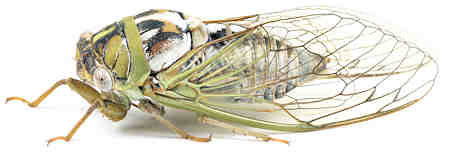 Billions of cicadas are singing songs in the trees along the Front Range this summer after emerging from their homes under the soil.
Billions of cicadas are singing songs in the trees along the Front Range this summer after emerging from their homes under the soil.
A specific variety of cicada, the Tibicen dealbatus, is particularly active, making a buzzing sound in the heat of the day and into the night.
“What they’re doing is singing a kind of love song,” says Boris Kondratieff, a professor of entomology and director of Colorado State University’s C. P. Gillette Museum of Arthropod Diversity.
In other words, the insects are calling mates. Males, he says, force air through a part of their body called the timbal, which creates a whirring noise that's appealing to females. In any given area where cicadas are active, thousands compete for the attention of a female, Kondratieff says.
Cicadas lay their eggs and the young, called nymphs, remain under the soil for up to five years, he says. There, they use a beak-like protrusion to attach themselves to a tree root for sustenance -- mere water and sap.
“They basically drink it like a kind of sweet tea,” Kondratieff says. "That's enough to keep them going."
The Tibicen dealbatus cicadas are now active in cities along the Front Range, from Fort Collins in the north to Pueblo in the south, he says. They do little damage to most crops and gardens, he says.
In symphony, the insects create a droning sound that resembles an alarm or vintage sci-fi sound effect. For some, the sound is beautiful; there are smartphone apps that use cicada sounds to lull people to sleep.
The "dog-day" cicadas are not the only sound emanating from the mish-mosh of indigenous and alien trees and foliage in the yards making up the "urban forests" of Colorado. There are myriad other varieties of cicadas, including some that make a distinct clicking noise, which are active in Colorado, along with crickets.
When the first hard freeze of winter comes, the cicadas die off. That is if a long list of predators, including birds and spiders, don't get to them first.
An ode to the cicada
We know that you are royally blest
Cicada when, among the tree-tops,
You sip some dew and sing your song;
For every single thing is yours
That you survey among the fields
And all the things the woods produce,
The farmers' constant company,
You damage nothing that is theirs;
Esteemed you are by every human
As the summer's sweet-voiced prophet,
The Muses love you, and Apollo too,
Who's gifted you with high-pitched song.
Old age does nothing that can wear you,
Earth's sage and song-enamored son;
You suffer not, being flesh-and-blood-less
A god-like creature, virtually.
(From “Anacreontea,” Greece circa 5 A. D., and translated by Rory B. Egan, “Cultural Entomology Digest”)








